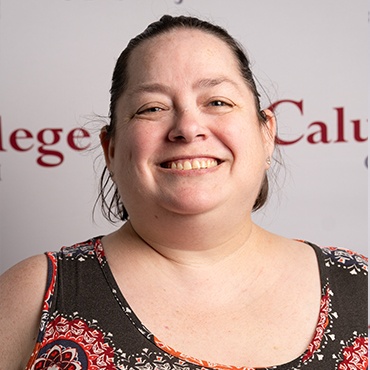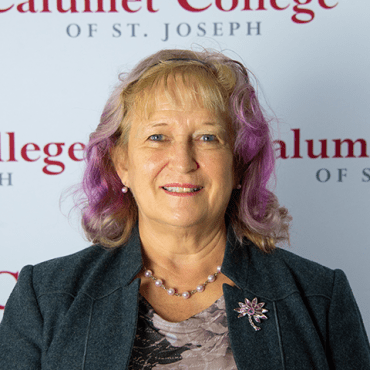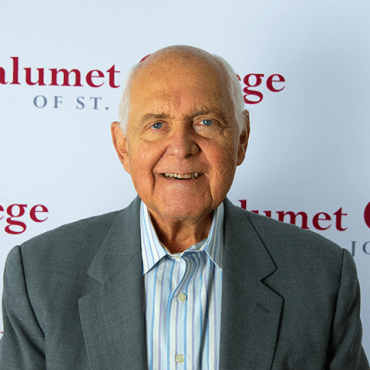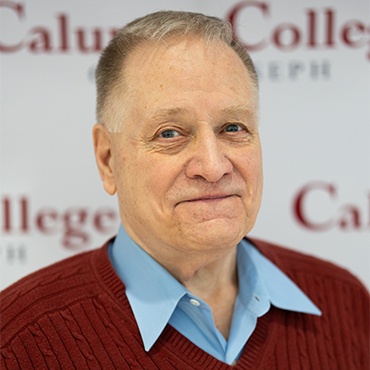
Psychology + Human Services Program
CALUMET COLLEGE OF ST. JOSEPH’S PSYCHOLOGY AND HUMAN SERVICES PROGRAM SUPPORTS YOUR PASSION FOR MAKING A POSITIVE DIFFERENCE IN THE LIVES OF INDIVIDUALS, GROUPS AND THE COMMUNITY
Our innovative Bachelor of Science in Psychology and Human Services offers students the unique opportunity to develop a career rooted in their values of service, compassion and care. Students pursuing this hybrid degree integrate the theoretical frameworks and skills relevant to both of these areas of study.
Through your psychology coursework, you will learn:
- the scientific method to understand the inner workings of the human mind, the thoughts, feelings and behaviors of individuals and groups
- how to describe, explain, predict, and influence behavioral and mental processes
- theories of behavior and build foundational skills to meet the growing need for skilled professionals in a variety of settings
You will apply this knowledge to the Human Services field, where your courses in counseling and advocacy will teach you:
- to understand the important role that psychological and social development plays in shaping the lives of marginalized individuals and their communities.
- how to build strong, trusting and culturally sensitive relationships with diverse populations
Human Services expands your scope of influence by providing advocacy skills and an understanding of the social issues that impact communities.
While earning your Psychology and Human Services degree at CCSJ you can begin making a difference in your community before you even graduate. The program includes supervised practicum and internship experiences. As you practice applying your abilities to the field you will gain professional experience, learn real-world applications of your education, and foster connections in the community.
Request Information
Program Highlights
SPECIALIZED KNOWLEDGE ACQUISITION
Learn from experts in the field of psychology and human services, our faculty have experience in research, assessment and treatment planning. Our experienced faculty assist clients in schools, healthcare settings, residential treatment facilities, counseling centers, marketing and research departments, court systems, and law enforcement agencies.
ETHICAL AND LEGAL AWARENESS
Gain an understanding of the various codes of ethics that govern the profession. They include the American Psychological Association, the National Organization for Human Services, National Association of Social Work and the American Counseling Association.
INDUSTRY-RELEVANT SKILLS DEVELOPMENT
Develop skills required in the profession, such as critical thinking, assessment, listening, engaging, empathy, writing in APA style, interviewing, self-care, and case management.
NETWORKING AND INDUSTRY EXPOSURE
Facilitate connections with industry professionals through networking events, guest lectures, and partnerships with agencies and organizations to enhance students’ internship and career opportunities.
EXPERIENTIAL LEARNING OPPORTUNITIES
Gain hands-on experience through internships, and practical projects that allow students to apply theoretical concepts to real-world scenarios within the profession.
CAREER PREPARATION
Obtain tools and resources necessary for successful entry into the helping profession, including resume-building, interview skills, and understanding career pathways within the field.
Faculty
Maria Arizzi, Ph.D.
Tina Ebenger, Ph.D.
Tony Franco, D.B.A.
Elizabeth Guzman-Arredondo, M.S.W., L.S.W.
Terry Harman, D.Min., Ph.D.
Joseph Kovach, Psy.D.
Martha O’Danovich, Psy.D.
Anthony Poole, M.S.W., M.P.A., M.A.C.
LaConyea Pitts Thomas, M.S.W., L.C.S.W.
Dion Smith, M.A.
James P. Sullivan, Ed.D
Jennifer L. Vickers, M.H.S.
Career
Options
A Bachelor of Science in Psychology and Human Services opens many doors to fulfilling career opportunities. Career options with this major include, but are not limited to:
- Counselor
- Labor Relations Specialist
- Case Manager
- Market Researcher
- Child Family and School Social Worker
- Life Coach
- Psychiatric Tech
- Career Counselor
- Rehabilitation Counselor
- Drug Abuse Counselor
- Mental Health Social Worker
- FEMA Corps Member
- Court Appointed Special Advocate
In addition, students may pursue Psychology to prepare for graduate school.

Frequently Asked Questions
A degree isn’t a necessity, but it will probably help you get hired. When you earn a Bachelor of Science in Psychology and Human Services, you may have an advantage in both earning potential and salary. People with a bachelor’s degree also have a 50% lower rate of unemployment, and on average they make an additional $630,000 to $900,000 over their lifetime.
Yes, the Psychology and Human Services program at Calumet College of St. Joseph offers internship opportunities that allow students to gain practical experience in the field. Internships provide hands-on learning, networking opportunities, and a chance to apply classroom knowledge in real-world settings. Our Career Services office can assist students in finding suitable internship placements.
That’s really up to you! Psychology and Human Services are big fields and you’ll have lots of options. Typically, you’ll discover what you’re passionate about in your second or third year. For example, if you’re the person your friends always turn to in a moment of need, it may be social work or counseling. If you want to analyze and provide insight into human behavior, you may lean toward market research. With your Psychology and Human Services degree, the possibilities available to you across industries are essentially endless.
This major may be right for you if you are service-oriented, if you want to work with people to solve problems, if you are looking for a degree that opens a ton of doors to different high-growth careers, if you have a knack for active listening and communication, and if you’re looking for a way to take part in bringing about a better future for yourself and your community.
Definitely not. Psychology and Human Services grads have plenty of other opportunities across a variety of industries—not to mention a skill set that will be invaluable across many careers.
Program
Objectives and requirements
Upon completion of this program, it is expected that students will:
- Critical Thinking: Students will analyze and interpret information from multiple perspectives, questions assumptions and conclusions, and understand the impact of biases, including their own, on thinking and learning.
- Ethical and Social Responsibility in a Diverse World: Demonstrate application of the biological and conceptual languages of the brain and their potential permutations and combinations and the ability to synthesis this knowledge to the creation of new frameworks of thought.
- Quantitative, Mathematical and Scientific Reasoning: Students will be able to describe how scientific theories are generated from empirical data and how practical scientific problems are approached and solved using the scientific method. Students will interpret and design basic psychological research.
- Effective Oral and Written Communication: Students will be able to speak and produce writing in a clearly expressed, purposeful, and carefully organized way that engages and connects with their audience. Students will exhibit effective presentation skills for different purposes and demonstrate competence in using technology to support presentation of ideas.
- Professional Development and Personal Growth: Students will identify and actively engage in behaviors conducive to individual health, well-being or development and understand the value of maintaining these behaviors throughout the lifespan. Students will develop meaningful professional directions for life after graduation.
- Knowledge Base: Students will demonstrate fundamental knowledge and comprehension of the major concepts, theoretical perspectives, historical trends, and empirical findings to discuss how psychological principles can be used to explain social issues. Dress pressing societal needs, understand and resolve interpersonal and intercultural conflicts, and inform public policy in a diverse society
120 credit hours
The following are required for a baccalaureate degree:
38 hours: General Education
Students must complete the following:
MATH 104 Precalculus
OR MATH 110 Finite Mathematics
PSY 100 Introduction to Psychology
19 hours: Requisites for the Major
HSV 100 Introduction to Human Services
HSV 200 Introduction to Alcoholism and Drug Abuse
HSV 220 Human Services Models and Methods
PSY 210 Research Methodology
PSY 217 Careers in Psychology
PSY 230 Statistics for Behavioral Science
PSY 260 Psychological Testing
27 hours: Upper Level Courses in Major
HSV 300 Family Dynamics
HSV 305 Theoretical Bases of Counseling
HSV 319 Case Management
HSV 328 Counseling the Chemically Dependent
HSV 358 Social Service and Public Policy
HSV 400 Crisis Intervention
PSY 315 Personality Psychology
PSY 320 Social Psychology
PSY 335 Abnormal Psychology
PSY 340 Developmental Psychology
PSY 351 Brain and Behavior
HSV 496 Topics in Human Services
OR PSY 496 Topics in Psychology
3 hours: Experiential
HSV 495 Practicum
OR PSY 495 Field Instruction
24 hours: Electives
You Belong
at Calumet College of St. Joseph!







